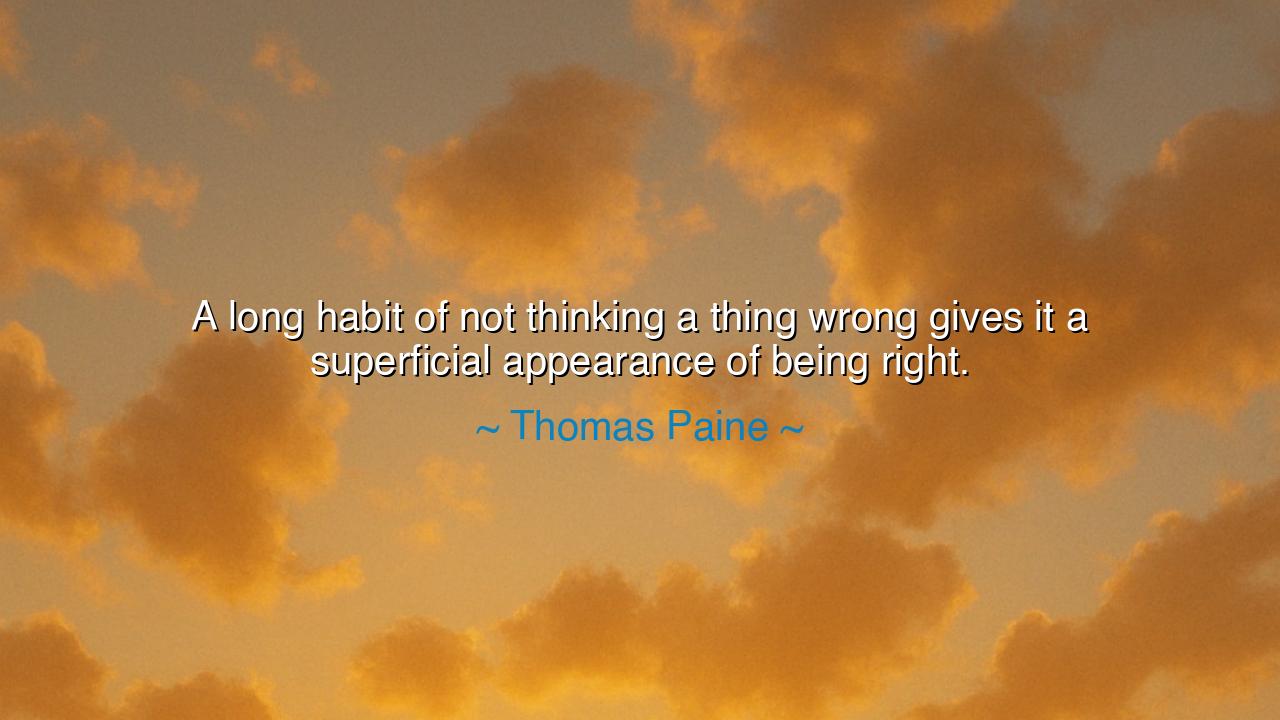
A long habit of not thinking a thing wrong gives it a
A long habit of not thinking a thing wrong gives it a superficial appearance of being right.






The words of Thomas Paine, “A long habit of not thinking a thing wrong gives it a superficial appearance of being right,” cut to the heart of human blindness. He warns us that evil, if left unchallenged, wears the mask of custom. What is tolerated long enough ceases to look like error, and what is endured for generations begins to pass as truth. Yet this is a falsehood born of habit, not of justice. For time may dull the conscience, but it does not sanctify what is corrupt.
The ancients knew this peril. They saw how whole societies could be built upon injustice, defended by tradition and shielded by familiarity. Slavery, tyranny, and oppression were often treated as natural simply because they had endured. Paine, in the fiery days of revolution, spoke to awaken men from this slumber, to remind them that repetition does not make wrong into right. To see clearly, one must strip away the veil of habit and measure all things against the eternal laws of truth and freedom.
History bears vivid witness. For centuries, the Atlantic slave trade was accepted by nations, justified by laws, and even defended from pulpits. To many, it seemed unshakable, a fixture of life. Yet when voices rose—Wilberforce in England, Frederick Douglass in America—the world began to see that what appeared “right” by habit was in fact monstrous. Their struggle proved Paine’s wisdom: that the long shadow of a false custom must be shattered by the light of conscience.
Paine’s words also sound a warning for every generation. For the evils of one age are rarely seen by those who live comfortably within them. What we excuse today by saying “this is how it has always been” may be condemned tomorrow as cruelty or folly. To guard against this, one must not trust habit, but question it; not rest in the comfort of tradition, but examine whether it aligns with justice.
Let this teaching endure: truth is not measured by years, nor justice by custom. A thousand years of wrong does not make it right, and even the oldest habit may be a chain that binds the soul. Therefore, let men and women be ever vigilant, testing their ways not by age, but by righteousness. For Paine’s voice still cries: break the spell of false appearances, and let the conscience, not mere habit, be the measure of right and wrong.






LTTuan long Tran
Civically, the warning hits hard. Institutions normalize practices through repetition—phrases in laws, police procedures, school admissions rules—until dissent seems unruly, not principled. How can we build friction into the status quo so it must re-earn legitimacy? Ideas: expiry clauses for emergency powers, mandatory impact audits on vulnerable groups, and public “assumption libraries” that explain the why behind policies. Closed question: should constitutions require routine reauthorization of inherited statutes, forcing lawmakers to state the moral case anew in plain language?
MTMai Truc
Personally, I see this in micro-habits: dismissing a coworker’s idea, skipping small safety steps, scrolling past stories that don’t fit my priors. Familiarity turns off alarms. What’s a realistic routine to keep conscience awake without burning out—weekly bias check-ins, a “pause and ask why” sticky note, or pairing with a skeptic buddy who can veto autopilot decisions? I’m experimenting with a mistake log that tags “habit made me do it.” Open question: which cue helps you notice drift earliest—data, feelings, or feedback?
TTu
Part of me wants to defend tradition; another part fears how comfort disguises damage. What criteria separate wise continuity from quiet complicity? Maybe a checklist: who benefits, who bears costs, is consent ongoing or presumed, what alternatives were tested, how reversible is the choice? I’d add an empathy drill—invite those most affected to write the first draft of the rule. Closed question: do you favor periodic citizen juries to examine long-standing policies and recommend repeal unless clear public interest is demonstrated?
DTTien dung Trinh
As a reader, I feel warned about the way routine anesthetizes judgment. Customs become wallpaper; after a while we stop seeing them. What practices snap us out of that trance before harm calcifies—rotating devil’s advocates, red-team reviews for norms, or a quarterly “assumption inventory” where we list beliefs, owners, and evidence? I’m curious about a personal version too: calendar reminders to reinterrogate a belief I’ve held for five years. Closed question: should organizations publish sunset dates for internal rules unless someone actively renews them with transparent justification?